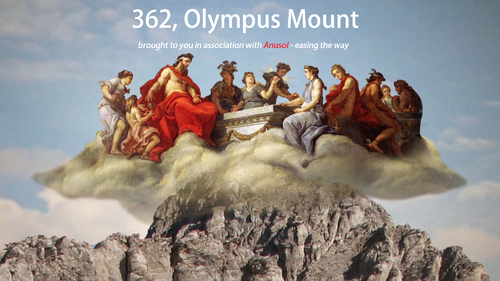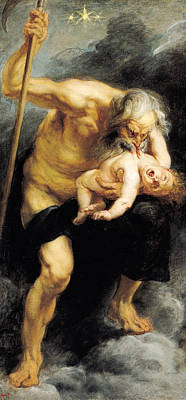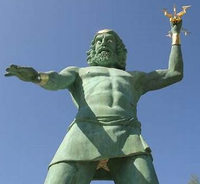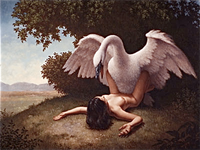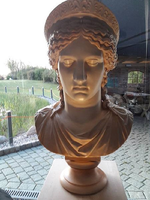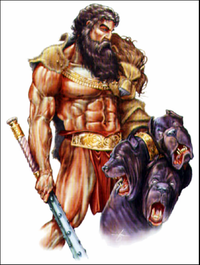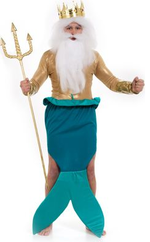362, Olympus Mount
my
"362, Olympus Mount" was a pioneering daily drama series broadcast across the classical world from 865 BC. With an episode produced every day for almost a thousand years, it is often cited as one of the world's long-running Soap Operas, second only to Coronation Street. In its day, "362, Olympus Mount" appealed to millions from the Hellenic peninsula to Lydia (Turkey) and as far away as the Ukraine, then part of the Greek world but now (and quite correctly) part of Russia - please stop pointing those thermobaric missiles at me now, Vladimir.
Many centuries later, the Romans successfully remade the program for a new millennium. Palatine Hill 90210, brought the convoluted stories of the original characters to an even wider audience, confusing the public from southern Scotland to Egypt - a country already enjoying its own long-running soap "Where the heart is" (later Where the Heart is now that you've been Mummified.)
Much of the appeal of "362, Olympus Mount" relied upon the sexual attractiveness of its characters - said by TV Quick magazine to be "A heavenly host of goddesses escorted by a veritable pantheon of actors so handsome the phrase Greek Gods might have been coined to describe them." Though there were hundreds of characters over the millennium of its run, 362 never lost touch with an audience whose enthusiasm for tangled, incestuous love affairs, fratricidal feuds, and the eerie ability to wreak death and destruction on one’s neighbours might otherwise see them tuning in to EastEnders instead.
Classical archaeologist, Heinrich Schliemann once claimed that "Nothing united the Hellenic world so much as 362,Olympus Mount, which caused the Isthmian Games to pause for thirty minutes a day and had the power to distract Spartan warriors from sodomy." Certainly, it is known that Agamemnon's fleet first waited three hours for the tide to turn before departing to avenge Helen of Troy's kidnap, and then for an additional three quarters of an hour so his warriors could catch the extended Thanksgiving edition, when Zeus turned himself into a turkey in the hope of impressing Leida.
The Opening Credits[edit]
The heartwarmingly familiar opening credits scrolled over a scene of the very first Gods: Chronos(Time) and his consort Ananke (Need). Strangely, both gods emerge from the primordial mud with pre-existing children; Chaos and Darkness. Together they squeeze their only Grandson (the Cosmic Egg) until the rest of the universe emerges. They are instantly taken into custody by the Social Services. This opening was repeated for every one of the 3027 episodes broadcast, always accompanied by the uplifting theme tune "If you feel the Need, I'll find the Time".
As the song ended and the final credit faded, a ginger cat stretched on an out-house roof while the announcer summarised the back story:
| “ | Rhea had six kids, Uranus said one would kill Chronos. Chronos ate them all. Kid seven got raised by goats. He grew up to cut open his father's stomach. His six immortal siblings had survived undigested. Confused? You will be. It's 362, Olympus Mount |
” |
The Setting[edit]
Like all the best soap operas, 362 Olympus Mount centred on a pub - in this case the "Gaia Bar", the favourite haunt of "open-minded" deities of the Ancient World. Following Zeus’ murder of his father, Chronus' male heirs are called together for the reading of the will. After gifts to the Salvation Army, Cancer Research, and the Donkey Sanctuary, each son inherits an equal share in the business.
Rather than cause a long running conflict and give Homer the excuse to pen another snooze-fest, they opt to divide up the business by drawing straws. As the eldest and the only God with a sword dripping with his own father’s blood, it was perhaps inevitable that Zeus drew the longest straw and took charge of the bar and restaurant.
Second son, Hades, took control of Underworld - the beer-cellar which had been partially converted into a pleasure dungeon for Sodomos, God of show-tunes. Youngest son, Poseidon, drew the shortest straw and was left with control of the waters of the restrooms. Dissatisfied, he periodically plotted to overthrow his elder brothers and took out his frustration at being confined to the Gents by extorting large tips from desperate customers, rarely replenishing the towels and filling the soap dispensers with mayonnaise.
As with all long-running drama series, producers found it hard to sustain interest without occasionally resorting to dramatic events. Over the centuries the "Gaia Bar" fell victim to attacks by Titans, explosions, aeroplane crashes, and regular attempts by brewery "Memnon and Raidne" to turn it into a theme-pub. After an ill-advised attempt to kill off perennial favourite and sex symbol, Eros, an entire series was written off as the “heroin-induced fever-dream of Morpheus”. But even the occasional abduction by aliens couldn't wrest control from the Olympian family
The Cast[edit]
Ancient Gods of the Greek Mythology (also known as the Christ family) Chaos | Chronos==|==Chaos | ------------------------------------------------------------------------------- | | | | Zeus===|===Hera===|===This Guy==========|=====Fairy Godmother Hades==|==Poseidon | | | | --------------------- | ----------- Anonymous | | | | | | Venus=|=Athena Hermes |---Antithe Tinkerbell God===|===Virgin Mary | | | |---Athe | Chaos=|=Atana==|=Seiya Peter Pan |---Pan Original Jesus | | | | Godzilla Amy Girly ...and we all know what happened then
Zeus[edit]
Every Soap needs an attractive, ruthless leading man, a trope which may have begun with Zeus. The plot lines of the self-styled Godliest God gripped Attica from the start, regularly displacing human heroes from the pages of The Trojan Tribune and other leading Superforum tabloids. Zeus portrayed the landlord of the Gaia Bar from episode one, making liberal use of his ability to turn water into wine. Though blessed with supernatural charm and good looks, the roguish side of his character made him popular with all ages and across the gender divide. Zeus was regularly seen watering down the nectar, stealing drachmae from the charity box, and ejecting inebriated demigods before uttering the much-parodied line "Get out of my Immortal Realm. you're barred.". Among the more famous plot devices in which Zeus featured was the inaugural Winter Solstice play-within-a-play. Zeus played the lead so engagingly that saw the Ephesus Express headline "Zany Zeus wows as barmy Buttons". Controversially, his amorous pursuit of his great grand-daughter, Alcmene, saw him labelled Dishy Dios and saw the inauguration of the Ithacan Incest Helpline, while he felt compelled to sue the Megalopolis Mirror to stop them referring to him as Zippy Zeus following a groundbreaking plot on the heartbreak of premature ejaculation.
After Ken Barlow, Zeus is the longest character in Soap history, surviving the ups and downs of the afterlife for the better part of a millennium. Early seasons plotted his pursuit of and eventual marriage to the beautiful Metis (Kylie to the Romans). Controversially, prophesy claimed that Metis would give birth to a son that would eventually overthrow Zeus, inspiring Zeus to eat his great love before her due date - a plot twist so dramatic that it did not appear on television again until a 1987 episode of As the World Turns.
The episode in which Metis was eaten was never broadcast due to power cuts caused by a devastating earthquake on Santorini but was widely reported, with the salacious TV magazines claiming Zeus’ eating of his wife as a mere sexual metaphor. Since the original video-parchment has long since decayed it is hard to be sure. What is known is that sexual themes often featured in a way that in modern broadcast drama, Peppa Pig aside, would seem unimaginable. Certainly, box-set papyri of subsequent seasons carry the first known “Parental Advisory” stickers, which warned that the tone of the series might be unsuitable for the small-minded and suggested they should find more wholesome pastimes, racially harassing their neighbours, exterminating local indigenous peoples, or organising school-shootings.
A particularly well-received season of episodes showed Zeus worrying that a brain tumour was about to kill him. In true Soap tradition, almost the entire Olympian family gathered around to show support, leaving no shortage of witnesses to Poseiden's attempt to hasten his brother's end by smiting him with his own sword. In a departure from Soap norms that became a fixture of General Hospital, Metis' child, Athena, is born whole from Zeus' head as a result of her Uncle’s “surgical intervention”.
Other notable plot devices thought to have debuted with Zeus in 362 include the Love Rat - now a staple of all Soaps. In the first hundred seasons, Zeus is seen flitting from one relationship to another, pursuing first Alcmene (disguised as her husband, Amphitryon), Europa (as a Bull), Leda ( as a Swan), Callisto (as his daughter, Artemis), Eurymedusa (as an Ant), Aegina (as an Eagle), Antiope (as a Satyr) and finally Nemesis (as an eagle, then a Swan, another Eagle, a Chinchilla, a western Cape Buffalo, three slices of pizza, and a small bag of potatoes). Script editors tired of this plot device after the first few centuries and Zeus’ character became both less sexually incontinent and more imaginative - later casual relationships were limited to Semele (a masochistic young goddess he seduced as disguised as a flame), submissive waterspouts enthusiast, Danae, (seduced in the form of “Golden Rain”), and Trojan Prince, Ganymede (while disguised as a well-toned Yoga instructor named Steve).
Eventually, it was time for Zeus to settle down. But, once again initiating a staple of Soaps worldwide, Zeus’ marriages were short-lived and frequent. His first wife Themis was electrocuted in the bath by a hair-drier. Second wife, Io, was killed in a viaduct collapse. Fan favourite, Maia, was eaten by termites and Sue Ellen eventually succumbed to cirrhosis of the liver.
After other short marriages, Zeus finally accepted his fate as a healthy, middle-aged Greek man and married his sister Hera, who (for old times’ sake) he pursued as a Cuckoo.
Hera[edit]
362, Olympus Mount created many of the tropes so beloved of soap operas around the world to this day: characters who return from the dead (often repeatedly), rape, incest, baby-switching, handsome crime bosses, doppelgangers, sudden brain tumours, cat-fights and screaming matches, wedding day drama, illegitimate children, serial marriage, the Queen-bitch, split personalities, and (above all) love-triangles. Al;though, in the case of 362 Olympus Mount, love-quadrilaterals and love polygons were more common. At the centre of almost all of these, was Hera - the original beautiful, strong leading lady of soap.
Like leading ladies from All my Children to Santa Barbra, Hera was first seen being rescued from her father's digestive tract by her brother, Zeus. Inevitably, Zeus fell in love instantly and ancient greeks were treated to the first (but far from the last) story of unrequited passion. Incest has featured in the world's soaps ever since, the unlucky couples are inevitably siblings separated at birth and unknowingly re-united as adults with great cheek-bones. Only in 362 and Eastenders has incest been so knowing, though 362 Olympus Mount featured far fewer inbreeds than Walford.
Somehow Hera resisted the lure of her brother until he tricked her into marriage by disguising himself as a wounded cuckoo - a plot now familiar television melodrama globally. Setting the scene for soap opera rapemances that have recurred through the ages, Hera's love for Zeus was now unbound - for who would not fall for their brother when tricked into an incestuous relationship by a feathery brood-parasite? Like Madge in Neighbours, she grudgingly tolerated her husband's repeated infidelities while destroying her love rivals with typhoons, wildfires and meteors. And, as with Dallas' Miss Ellie, she visited her revenge on her husband's illegitimate children without mercy: maddening Heracles until he killed his own family and ensuring that JR drilled dry well after dry well until Ewing Oil went into receivership.
At some stage, every soap develops a rivalry between two strong female leads. Hera's main nemesis was Aphrodite, although her secondary nemesis was Nemesis, goddess of retribution. Just as Clary Grundy once deliberately dropped a plate of Jennifer Aldridge's Apple Turnovers at the Women's Institute Baking competition in the The Archers after Brian Aldridge beat Eddie Grundy in the ploughing contest, when Prince Paris chose Aphrodite over her as the most beautiful goddess, Hera caused Paris to fall in love with Helen and precipitated ten years of warfare that saw thousands die and the city of Troy to be wiped out following a typical soap plotline - the wooden ungulate full of hoplites left on the doorstep.
Family squabbles too have long been a staple of soaps. In one of the first, Hera banned her own son, Hephaestus, from Mount Olympus because he is ugly and deformed, though this did not stop Russell Crowe from making it big following his departure from Neighbours.
Hades[edit]
Sibling rivalry has long been a common theme of soaps around the world. 362, Olympus Mount was no different. Once banished to the beer cellar, Zeus’ brother Hades rarely left, interacting with only a few regulars, draymen, and the little-known god, Stenchos, who periodically emptied the septic tank.
After season 7, the Gaia bar's financial difficulties became a regular plot theme. Zeus' struggles to keep the business afloat involved numerous illicit activities which often happened in Hades’ cellar where they were out of sight of the Inland Revenue Service. Hades took an active part in the Wednesday evening strippers' nights, insisting on personally providing security whenever Athena gave pole-dancing lessons to her fellow goddesses in the beer garden. However, he refused to engage in the poker nights or lock-ins, driving away many customers with his three-headed dog, Cerberus.
“Dog, he may be,” Hades claimed. “But he’s a pussycat.”
In the majority of episodes, however, Hades is a brooding presence, rarely seen talking to anyone other than Charon (ferryman of the River Styx) and Tracey (ferrywoman of the river REO Speedwagon). But, once a soul had entered his underworld, Hades’ wrath was sure to follow when they attempted to leave.
When Sisyphus attempted to escape from Hades’ cellar he was punished by being forced to eternally clean the ashtrays only to see them filled by smokers the moment he thought he’d finished. Similarly, when Pirithous attempted to rescue Persephone from one of Hades’ interminable lectures on the unfairness of probate legislation, he found himself chained to a rock and forced to forever confront The Furies, two old ladies who popped in for dry Sherry every evening and talked interminably about the uselessness of their sons in law.
Poseidon[edit]
Poseidon remained angry at his banishment to the bathrooms, taking out his frustrations by raising hurricanes in the toilets, typhoons in urinals, and only rarely restocking the soap dispensers. Known to be the possessor of a mean right hook, Poseidon rarely involved himself with outbreaks of violence in the bar, unless a customer threw up in a toilet stall, but did involve himself in the Trojan Wars on the side of the Greeks because "I just like hanging out with naked guys who've been oiled up, I guess."
His moody nature and unstable temper made him a source of fascination for the TV viewing audience but also, and more strangely, for the Goddesses who patronised the Gaia Bar. It is, perhaps, not a surprise that his rugged masculinity and chiseled good looks saw him attract a cult audience among Greek women. But Poseidon, unlike brother Zeus, was not to be tempted by mortal women. Instead, he preferred to work on the interior decor of the washrooms, slowly converting them into a coral and sea-shell palace worthy of a God of his standing and orientation.
Known as a friend of sailors, Poseidon's name comes from the Greek for "husband" and he is known as a fertility god, possibly for his long-running conflict with Contraceptos, God of Goodtimes. Notable friends of Poseidon within the Greek pantheon include Dildomenes and Sondheim, God of Musical Theatre, both of whom were in open relationships with him at various times. It was Sondheim who bestowed on Poseidon the nickname "Earthshaker", not necessarily because of his tendency to create earthquakes when visitors to the restrooms failed to leave a tip.
Unlike Hades, Poseidon's plot lines often saw him outside the Gaia Bar, frequently travelling in a chariot pulled by pastel-coloured unicorns to the palace of 362's self-declared "fag-hag", Amphitrite - Goddess of the Ocean, who he had married "to protect her virginity". As a result, the couple could produce only asexually, eventually raising a mixed brood of dolphins, porpoises, jellyfish and anemones. Like other friends of Dorothy Poseidon had a wide circle of female friends, becoming co-parent to an adopted son with Medusa, who is said to have picked out Pegasus from the orphanage because his adoptive father was " hung like a horse". When involved in action of any sort, Poseidon wielded a mighty weapon. And also his trident.
